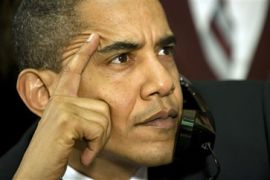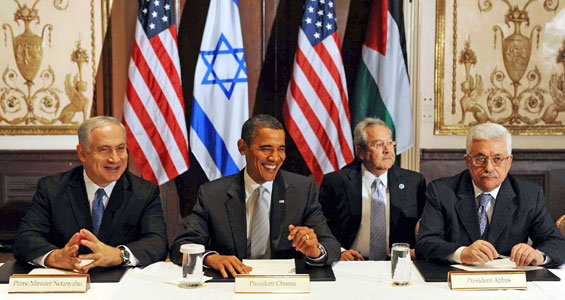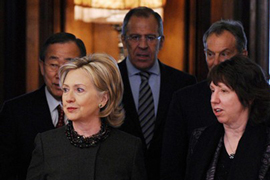Can the US broker a breakthrough?
Obama has a unique chance to make tangible progress in the peace process, author says.

 |
| Obama, centre, must act quickly and decisively to pressure the Israelis to halt settlement expansion and force them back to the negotiating table with the Palestinians, Esposito says [EPA] |
A leader of the Tea Party movement, a group opposed to the policies of the Obama administration, recently characterised the passage of the Healthcare Bill – which for a while appeared to have been on life support – as a Phoenix rising from the ashes.
Barack Obama now has another Phoenix-like opportunity to achieve what no US president has been able to do – broker a lasting peace in the Palestine-Israel conflict.
The Middle East peace process appears to be nearing its death knell and US-Israeli relations are described by some commentators as at an all-time low.
General David Petraeus, the current commander of US Central Command, stunned many when he charged that “insufficient progress” in resolving the Arab-Israeli conflict ultimately hurts America’s ability to advance its interests in the Middle East.
In testimony before the Senate Armed Services Committee, Petraeus called the conflict one of the “root causes of instability” and “obstacles to security” in the region and argued that serious progress in the peace process could weaken the influence of Iran, which has used the conflict to fuel support for its terror group proxies.
In a private conversation with the head of the Joint Chiefs of Staff, Petraeus reportedly warned of the threat to US troops in Iraq and Afghanistan if the peace process remains bogged down.
European criticism
| in depth | |||||||||||||||||||||||||||||||||||||
|
Europe and the international community have not been far behind in their criticisms of Israeli actions.
David Miliband, the UK foreign secretary, recently said that the Palestinian-Israeli standoff is the “greatest recruiting sergeant” for al-Qaeda.
The Middle East quartet (the UN, the EU, Russia and the US) strongly denounced Israeli’s “unilateral” plans to build 1,600 new homes in East Jerusalem and said the status of Jerusalem could only be resolved through negotiations between both parties.
Lady Ashton, the EU’s foreign policy chief, stunned by her recent visit to Gaza, is reported to have described humanitarian conditions there as “worse than Haiti.”
The Israeli response to this criticism is rather telling.
Binyamin Netanyahu, the Israeli prime minister, came all the way to Washington to make crystal clear that he has no intention of entering into good-faith peace negotiations.
If the Israeli government’s conduct during Vice-President Joseph Biden’s visit to Jerusalem was described as a slap in the face and an “insult to the US,” then Netanyahu’s arrogant, rejectionist track record was once again in evidence with his obstinate performance at the White House two weeks ago.
It has become that a strong US-led initiative is the only way forward in breaking the log-jam in Palestinian-Israeli negotiations.
Israel’s will be done
But Netanyahu’s attitude should not come as a surprise; his Israeli predecessors have all, at the end of the day, gotten their way.
They are always assured, as seen more recently in Israel’s wars with Hezbollah in Lebanon and its invasion and devastation in Gaza, that they could ultimately operate with impunity.
Henry Siegman, the former executive director of the American Jewish Congress (1978-1994) and current director of the US Middle East Project in New York, recently said that Israel had a bizarre notion that halting its continuing theft of Palestinian territory beyond the Green Line was a heavy “concession” that should be rewarded with concrete Arab measures.
Such a position would predicate that Arab “gestures” are necessary to justify US demands that this thievery end.
It is this perverse redefinition of Israel’s obligation to cease its illegal confiscations of Palestinian territory as a concession that finally outraged Washington.
“Gobbling the pizza”
 |
| The Quartet strongly condemned Israel’s new settlement expansion plans [AFP] |
Writing in The Guardian last month, Avi Shlaim, a prominent professor of international relations at Oxford University, described Netanyahu’s approach to negotiations and his settlement policy “like two men negotiating the division of a pizza while one continues to gobble it up.”
As Zeev Sternhell, an Israeli historian at the Hebrew University of Jerusalem, observed in Haaretz: “Were Israeli society prepared to pay the price for peace, its government would not be fanning the flames of conflict at the Tomb of the Patriarchs, in Sheikh Jarrah and the Shoafat ridge, nor would it be wrestling with the United States over expanding the settlements.”
Sternhell questioned the rationale of demanding that the Palestinians recognise the results of the 1948 war with the Arabs and the legitimacy of the Jewish state while Israel continues to seize their lands.
“If building in Shoafat and Silwan [West Bank Palestinian neighbourhoods] is the same as building in Tel Aviv in the eyes of the Israeli government, the only solution is an imposed one,” he says.
If Obama were to impose a solution, he will likely face stiff opposition from the Israel lobby and many members of Congress, a host of commentators with easy access to major media, and hard-line Evangelical Zionists.
The challenge, then, is whether he can seize this opportunity to turn the corner and bring real pressure to bear on the Netanyahu government.
The current apparent impasse could in fact prove to be a unique moment and opportunity for this US president to position the White House as an honest broker and pressure all parties to come to the table.
Israel has the proven friendship of Obama, Biden, Clinton, and many members of the administration, including Rahm Emanuel, David Axelrod and Dennis Ross.
America’s Jewish community
Despite the continued strength of the Israel lobby, it is increasingly clear that its hard-line, uncritical stance does not represent the majority of the American Jewish community.
A new poll of American Jews from the pro-Israel, pro-peace lobby J Street reveals that Obama enjoys significant Jewish community support for a strong US role in the peace process.
His approval rating in the Jewish community remains strong, holding steady at 62 per cent (Gallup previously reported 64 per cent approval rating in an October 2009 poll).
Obama’s approval rating among Jews is 15 points higher than among all Americans (47 per cent) according to a Gallup poll conducted during the same period.
American Jews by a four-to-one margin, 82-18 per cent, support the US playing an active role in helping the parties to resolve the Arab-Israeli conflict.
Some 73 per cent of American Jews support this active role even if it resulted in public disagreements with both the Israelis and the Arabs.
According to the same polls, 60 per cent of American Jews believe Israel’s announcement of new housing in East Jerusalem caused damage to US-Israel relations.
Fifty-five per cent say the White House was right to strongly criticise the Israeli announcement of new housing in East Jerusalem during Biden’s visit.
Quick, decisive moves
The administration, with strong leadership from Clinton and a greatly accelerated pace by Senator George Mitchell, in consort with the other Quartet members and support from Arab and Muslim allies, will have to move quickly and decisively.
They will have to insist on clear preconditions regarding the settlements and Netanyahu’s claim to all of Jerusalem; they must do more than simply urge Israel to lift its devastating blockade of the Gaza Strip and open it to humanitarian and commercial traffic.
They must insist on the Quartet’s call for Israel to freeze all settlement activity “including natural growth”, to dismantle outposts erected since March 2001, and to “refrain from demolitions and evictions in East Jerusalem”.
This may seem like be a giant step forward, but it is only a first step on the very difficult and rough road to peace.
The clock is ticking in a dangerous and deteriorating situation in which Palestinian and Israeli lives alike are threatened.
Justice and an end to the occupation of internationally recognised Palestinian lands is long overdue.
John L. Esposito is University Professor and Professor of Religion & International Affairs, Georgetown University. His most recent books are: The Future of Islam and, with Dalia Mogahed, Who Speaks for Islam? What a Billion Muslims Really Think.
The views expressed in this article are the author’s own and do not necessarily reflect Al Jazeera’s editorial policy.
